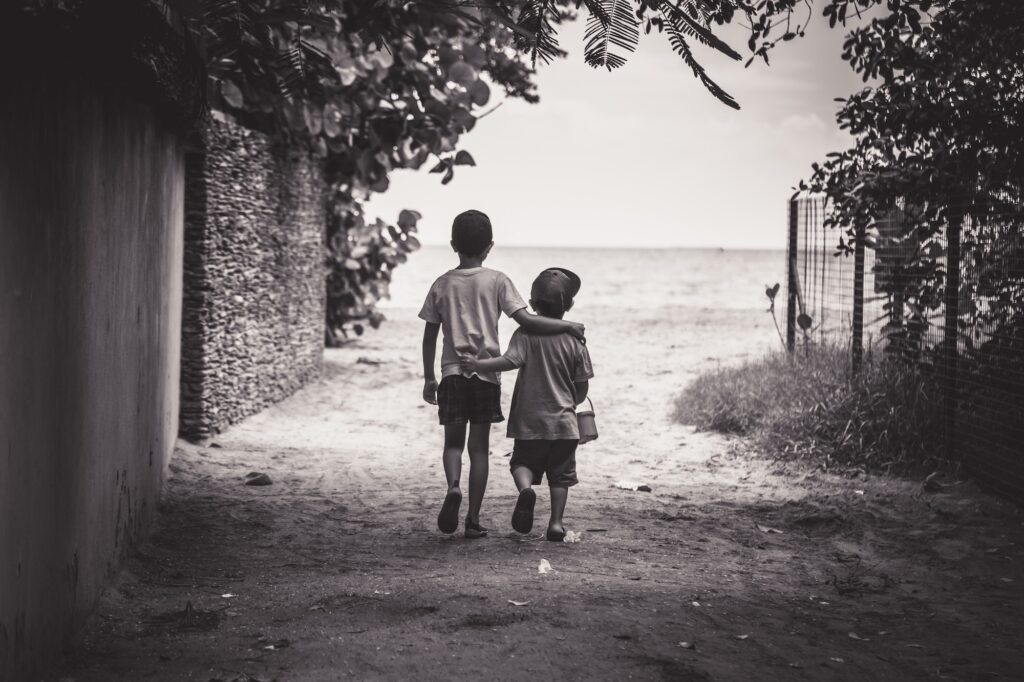
In May of 1999, a historic F5 tornado ripped through my neighborhood destroying homes and disrupting lives. Just hours before the storm turned my hometown into a war zone, I played tennis under clear skies with my childhood best friend Melissa. When the tornado hit, I was with her inside the eye of the storm while my family was safely miles away from the twister. After chaotic hours of digging through debris and witnessing catastrophic devastation, my parents reunited with me, and we hunkered down in a hotel unable to return to our home because of destruction. After days of being away from Melissa, unable to connect with anyone who had gone through the storm, I found myself incredibly sad and isolated in the trauma I had just experienced. To make matters worse, because so many affected people were scrambling to get hotel reservations every night at overbooked establishments, we had to move from one accommodation to the next. Everything felt unsettled.
A week after the tornado, my parents got a reservation for a suite at a DoubleTree—the one with the good cookies. With so many displaced kids as guests, the hotel staff decided to extend the pool hours so families could have something to do while being away from our typical creature comforts. Grateful, my brother and I decided to head down to the pool for a late night swim. When we pushed the button for the elevator, the doors opened like a scene from a movie, and Melissa was standing inside holding her towel and goggles. Without thinking I lunged toward her for a hug and fought back tears (I thought I was too cool for those). We spent most of the night organizing games for the younger swimmers until the chlorine stung our eyes, and then eating cookies late into the night and talking about what we saw the night of the tornado. The next day we convinced our parents to let me stay with Melissa’s family until our neighborhood was livable again. We still had to move from hotel to hotel, and our neighborhood would still need weeks before we could return to living in our homes. Yet, having my friend made everything feel a bit more settled.
I believe God orchestrated the reunion with Melissa in my time of great need because God is in the habit of giving us one another when we face trials. In part one of the Loneliness Epidemic series, we discussed how being made in the image of a trinitarian God meant that true human flourishing can only take place when we pursue self-donating, loving relationships. In this article we will see how God lovingly cares for us by providing those relationships, like Melissa.
God Provides
In the days of King Ahab (bad guy), God sent the prophet Elijah to rebuke Ahab and his malevolent wife Jezebel. Rebuking the powerful often comes with a cost. Elijah had to hide out in a wadi and wait on ravens to bring him his daily bread and meat. After the channel dried up because of the drought God brought upon the land due to “Ahazebel,” God then sent Elijah to visit a widow who barely had enough food to provide for her family. Like the days in the wilderness, God gives her all she needs for each day. But, as Elijah was staying with the widow, her son fell ill and she blamed Elijah for the tragedy. Moved greatly, Elijah begs God to resuscitate the child. God obliges, and the woman praises God and compliments Elijah.
At this point, Elijah probably needs a vacation. He’s rebuked the king and queen and then had to hide in a ravine while waiting on the unkindness (actual name for a flock of ravens) to visit him each day. Then, when the beady-eyed door dash ends, God sends Elijah to a poor, starving widow and has him watch as this woman who has already lost her husband loses her son as well. Thankfully, God raises the dead, but surely God’s next task for Elijah is a little less traumatic.
“After a long time, in the third year, the word of the Lord came to Elijah: ‘Go and present yourself to Ahab . . .’” (1 Kings 18:1). Well, at least some time has gone by, maybe bygones are bygones. “As surely as the Lord your God lives, there is no nation or kingdom where [Ahab] has not sent someone to look for you” (1 Kings 18:10). Neat. Since Elijah went on the lam, Ahab has sent murderous search parties looking for him, and Jezebel decided to murder several of the Lord’s prophets prompting another—Obadiah—to hide a hundred more prophets in two caves. If those guys thought they had it bad, at least Obadiah brought them food instead of ravens. When Ahab and Elijah finally meet, Ahab accuses Elijah of ruining Israel—projection much? This reunion leads to a showdown between the prophets of Baal and the God of Israel. Elijah calls down fire from heaven, slaughters the false prophets, and prays for rain to fall on dried-up Israel. Elijah triumphs over Ahab and the false prophets, and then you read just a couple of lines later in the Scriptures that Jezebel threatens to murder Elijah and he naturally becomes afraid and runs for his life.
When we read these incredible stories about Elijah, sometimes the grandiosity of the events overshadows his humanity and frailty. Following God’s instructions led Elijah to literal mountaintop glorious moments, but they also brought him to low wadi moments of true suffering. His faithfulness to God brought him to a place where he was literally running for his life and then collapsed under a tree asking God to take his life. His prayer, “I have had enough. Lord, take my life . . .” (1 Kings 19:4) are not the words of a hyperbolic, dramatic, immature man. They are the utterances of true lament and grief that often comes after loss, trauma, and brokenness. The top of Mt. Carmel is instructive to us about God’s power and our participation in it, but the bottom of a broom tree also has much to teach us.
After passing out from utter exhaustion and fear, an angel gently wakes our wearied prophet. Now, hit pause for a moment. Here’s God’s man. He rebuked wicked royalty, helped resurrect a boy, commanded down fire from heaven, slaughtered false prophets, prayed for rain that came, and now lays spent below a tree. How do you expect God to respond to this moment of need? Do you expect something big? Do you expect fireworks, trumpets, and fanfare?
No. None of that. Instead, God gives Elijah a snack, a nap, and a friend. Elijah is at the lowest moment of his life, despairing unto death. And God gives him food, rest, and a companion. Elijah ate the loaf of bread the angel delivered and then slept again. God gave more food, and then eventually moved him to safety. Then, “Elijah . . . found Elisha son of Shaphat. He was plowing . . . Elisha then left his oxen . . .[and] he set out to follow Elijah and became his servant” (1 Kings 19:19-21). A snack, a nap, and a friend. God gives us each other. Elijah spends most of his prophetic years hiding alone in a cave and then God gives him the widow. Then, after the widow, God sends Elijah into his biggest challenge yet. God provides throughout the entire ordeal, and when Elijah collapses from the exhaustion of it all God does not rebuke him or ignore him. Instead, God gently restores him through what Elijah needed most. He needed food, he needed rest, and he needed a companion. God provided.
Elijah and Elisha are just one example of God being in the habit of giving us one another. When David faced the Philistines and an envious and unhinged Saul, God gave him Jonathan. When Naomi faced famine, widowhood, and the untimely death of her two sons, God gave her Ruth. When Moses faced a tyrannical and murderous Pharaoh, God gave him Aaron. When Barak faced an overpowering and threatening Sisera, God gave him Deborah. Mary had Elizabeth, Paul had Barnabas, Esther had Mordecai, and on and on we go. This is why we should not be surprised when the New Testament letters hoping to provide wisdom for how to live as the kingdom people of God include so many “one another” passages. We are to love, honor, build up, be devoted to, teach, bear with, exhort, encourage, be patient with, etc. with one another. If God is in the habit of giving us one another, we should not be surprised that the Scriptures have much to say about how to live with each other.
In this epidemic of loneliness that society is facing, it should be good news to us that God is in the habit of giving us one another. If you feel more like Elijah in the wadi eating food from ravens and less like the prophet walking with his new friend Elisha, ask God to do what he is in the habit of doing. Ask God to give you another.

